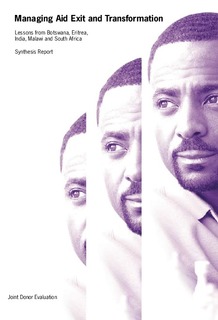| dc.contributor.author | Slob, Anneke | |
| dc.contributor.author | Jerve, Alf Morten | |
| dc.date.accessioned | 2018-01-04T08:16:48Z | |
| dc.date.available | 2018-01-04T08:16:48Z | |
| dc.date.issued | 2008-10-28 | |
| dc.identifier | oai:www.cmi.no:3155 | |
| dc.identifier.citation | Stockholm: Sida/Norad/ Danida/ Netherland's Ministry of Foreign Affairs 222 p. | |
| dc.identifier.isbn | 978-91-586-4056-6 | |
| dc.identifier.uri | http://hdl.handle.net/11250/2474674 | |
| dc.description.abstract | What are the consequences in the recipient countries, when donor countries close down their bilateral aid programmes? Are exit practices consistent with established principles of partnership and mutuality in development co-operation? These are the two main questions under scrutiny in this evaluation initiated in 2005 by four donor countries - Denmark, the Netherlands, Norway and Sweden.
The evaluation is based on country studies in Botswana, Eritrea, India, Malawi and South Africa including 14 exit cases involving any one of the four donors. It is a joint donor evaluation, and representatives of the partner countries were consulted in various ways. The evaluation was carried out in 2007/08 by a consortium of ECORYS (the Netherlands) and Chr. Michelsen Institute (Norway). It was guided by a Steering Group with representatives of the four commissioning donors, and Sida acted as lead agency in the management of the evaluation. | |
| dc.language.iso | eng | |
| dc.publisher | Sida/Norad/ Danida/ Netherland's Ministry of Foreign Affairs | |
| dc.relation.uri | https://www.cmi.no/publications/3155-managing-aid-exit-and-transformation | |
| dc.subject | Botswana | |
| dc.subject | Eritrea | |
| dc.subject | India | |
| dc.subject | Malawi | |
| dc.subject | South Africa | |
| dc.title | Managing Aid Exit and Transformation. Lessons from Botswana, Eritrea, India, Malawi and South Africa. Synthesis Report | |
| dc.type | Research report | |
